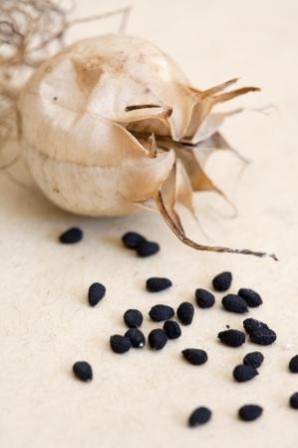Middle Eastern Medicinal Spice and Garden Annual
There was a time when spices were all valued for both their culinary flavors and their health promoting properties. They were the “state of the art” medicine used by doctors as well as for home remedies.
One very important spice from the Middle East has been in successful use for over 5000 years of recorded history. We are fortunate that it can easily be grown in our gardens since it feels at home with our San Diego weather conditions, not to mention that is a pretty cousin to “Love in a Mist.” The common name of this herb is Black Seed/Black Cumin. Don’t let the name fool you; this is not related to cumin, fennel, dill, anise or any of the other umbrella-flower type spices. The botanical name for this plant is Nigella Sativa. The “sativa” means cultivated and informs you that this plant has a long history of human use. The flower is a pale blue, five-petal bloom with abundant dark stamens in the center. Its surprise comes after the petals have fallen, when it forms an intriguing balloon seed pod reminiscent of a poppy pod.
The seeds of the “Black Seed” are collected and used to flavor stews, breads, pastries, and teas and they lend a mildly spicy, aromatic note to the food. The seeds are also cold-pressed for their oil which is also used in cooking, but is most favored as a medicine. This Omega-3 rich oil has been successfully used to treat respiratory, allergic, inflammatory, fever and pain conditions. It has captured much recent scientific attention for understanding its ability to stop cancer and improve immune respond. If you go to www.pubmed.gov (a data base of the U.S. National Library of Medicine and National Institute of Health/ NIH) you will find more than 600 current reports and evidence-based testing that confirm that has the ability to stop tumor growth and increase the Natural Killer Cell (NKC) production in the white blood cell.
Black Seed mentioned in the Bible in the book of Isaiah, in chapter 28, verses 25 and 27. These seeds were found in the tomb of Egyptian Pharaoh Tutankhamun, who ruled Egypt from 1333 BC to 1324 BC. Pilgrims passing through Turkey during the ancient Hittite empire, during 650 BC were found to be carrying flasks full of Black Seed with them on the long journey. Mohammed the prophet is reported to have said that black cumin seeds are “the remedy for all diseases but death.” With our large influx of immigrants and refugees from Africa, Turkey, Afghanistan, Iran and the Mediterranean, this product is becoming readily available in Middle Eastern grocery stores and online. I have a number of co-workers from these areas who all automatically recommend Black Seed Oil for any illness that comes along. They have current experience in using this plant seed for food and medicine. In fact, they tell me that they include it in their foods regularly as way to stay healthy.
At the Trees for Health Arboretum in Balboa Park, we will be planting the seeds as a re-seeding annual to grace the place with blooms and offer a first-hand look of the plant to visitors of the garden. We are about to find out whether the rabbits, squirrels and gophers have an appetite for Nigella sativa or if our native insects find it tasty. I hope that they will leave us enough to enjoy for this year and welcome back the next.
If you enjoy this kind of information about proven plant medicines, you might consider attending some or all of the Scripps Natural Supplement Evidence-Based Update conference January 16-18 at Paradise Point in Mission Bay. Visit www.Scripps.org/NaturalSupplements for more information. If you are a healthcare profession in need of CEU/CME they are available to attendees.
Category: Health & Fitness, Local News








